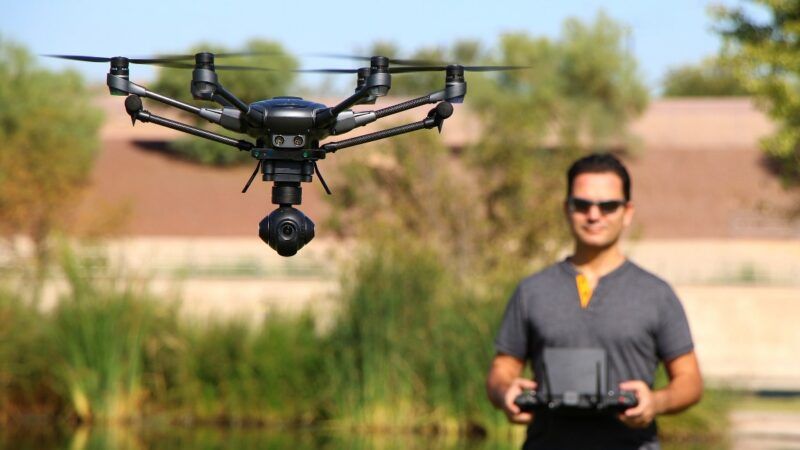Michigan Court Allows Town To Use Drones To Snoop Without Warrants. One Couple Is Suing.
The Institute for Justice argues evidence from warrantless searches can’t be used for zoning enforcement.

Can the government use drones to snoop on your property for zoning violations without having to get a warrant first? Right now it appears it can in Michigan, but a Long Lake Township couple is fighting back, with the help of lawyers from the Institute for Justice.
Todd and Heather Maxon have been fighting the zoning enforcement office of Long Lake Township for more than a decade over the couple storing several vehicles on their property. The township accused them of storing "junk" and brought a code enforcement suit against them in 2007. The Maxons fought back, and the township eventually agreed to drop the case as part of a settlement as long as the status quo was maintained.
But according to court documents from the State of Michigan Court of Appeals, neighbors complained that the Maxons had expanded the number of vehicles they were storing on the property. Long Lake Township investigated again. The township was unable to determine any zoning violations from the ground, so they hired a drone company multiple times between 2010 and 2018 to surveil the Maxons' property, flying overhead and taking photographs.
Eventually, Long Lake Township determined that the Maxons had expanded the number of stored vehicles on the property and filed civil suit against the couple to attempt to force them to come into compliance.
But the township never got a warrant for this surveillance, and so the Maxons turned to the courts to suppress the photo evidence as a violation of their Fourth Amendment rights. Initially, Michigan's Court of Appeal agreed with the Maxons that Long Lake Township had violated the couple's rights and suppressed the evidence. But then the state's Supreme Court vacated the decision and kicked it back down to the Court of Appeals to determine whether the exclusionary rule (which prevents evidence collected illegally from being used in a trial) actually applied in this case.
That's when the Maxons' argument ran aground, at least for now. The Appeals Court ruled in September that because this was a civil lawsuit, the exclusionary rule did not necessarily apply. The U.S. Supreme Court has repeatedly rejected the use of the exclusionary rule in civil cases. Chief Judge Elizabeth Gleicher wrote in the ruling, "The United States Supreme Court has explained that the purpose of the exclusionary rule is twofold: to deter police misconduct, and to provide a remedy where no other remedy is available. When analyzed under the federal or the Michigan Constitution, suppression of the drone evidence does not serve these goals." And so, the evidence can be used in a civil proceeding.
Note that this ruling doesn't indicate that the Maxons' Fourth Amendment rights weren't violated. Indeed, Gleicher writes that the court is operating on the assumption that the violation occurred. But, remarkably, the court believes that a violation of a constitutional right is not nearly as important as enforcing zoning rules, and so the illegally acquired evidence may be used. "Enforcement of the township's zoning ordinance in this situation may depend on the use of drone evidence. And even assuming some marginal deterrent value impacting township officials, the benefit of suppression of the evidence is vastly outweighed by the public's interest in enforcement of zoning regulations," Gleicher writes.
The Institute for Justice is now appealing that ruling to the Michigan Supreme Court to determine whether the Fourth Amendment's protections and the exclusionary rule require the suppression of this evidence. Its appeal to the state Supreme Court notes:
The Court of Appeals' majority opinion would let government officials conduct warrantless drone surveillance with impunity—even though that surveillance violates the Fourth Amendment. Worse, its decision creates a bright line rule: the exclusionary rule simply does not apply when the offending officers violate your Fourth Amendment rights in the course of looking for civil rather than criminal violations. That line in the sand is unsupported by caselaw and, in effect, would leave little incentive for a vast array of government officials from committing even blatant constitutional violations.
"If the government wants to conduct intrusive surveillance like this, the Fourth Amendment requires that it get a warrant," Institute for Justice Attorney Mike Greenberg said in a prepared statement. "The zoning authority's failure to even try to get one shows their indifference to Michiganders' constitutional rights."
It does seem like a troubling outcome. The purpose of the exclusionary rule is to discourage the government from collecting evidence illegally for the purpose of punishing people. If the courts decide that cities can use illegally collected evidence because it's a civil case and not a criminal case, that just blindly ignores that when the government files civil cases against citizens, it's frequently looking to punish them with fines. That should trigger the same Fourth Amendment concerns from the courts as criminal fines or penalties.

Show Comments (119)